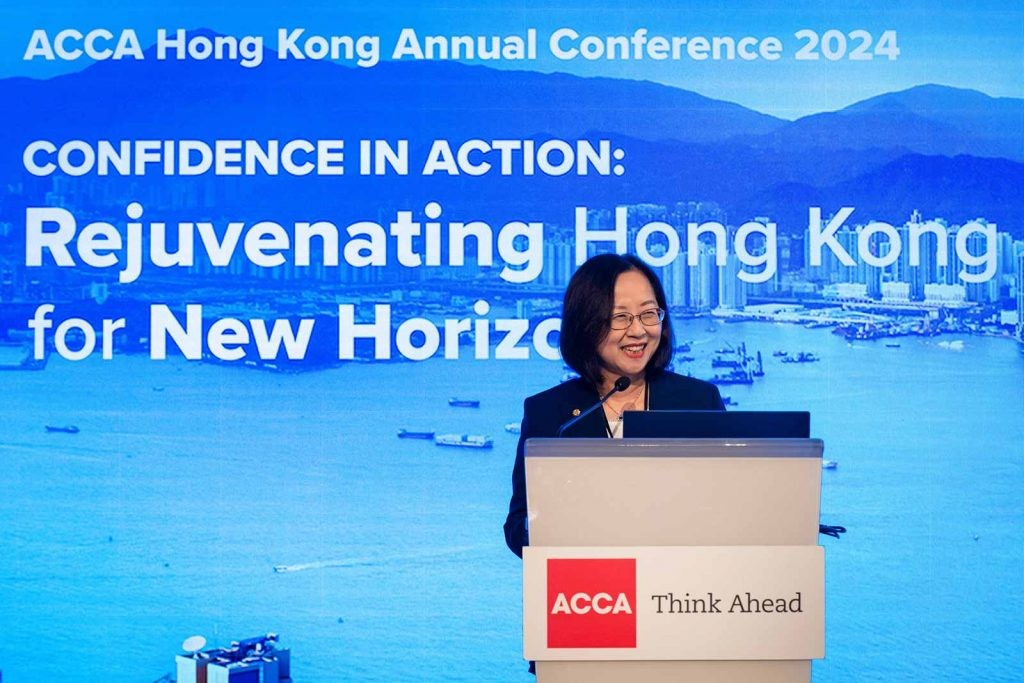
More than 100 guests and members recently gathered at the ACCA Hong Kong Annual Conference to explore strategies for rejuvenating Hong Kong’s economy and paving the way for high-quality and sustainable economic growth.
With its theme of ‘Confidence in Action: Rejuvenating Hong Kong for New Horizons’, this year’s conference addressed the vital need for businesses, government and the accounting community to discuss solutions during uncertain times.
In his welcome speech, Dr Danny Po FCCA, chairman of ACCA Hong Kong, said that the flagship event was a testament to ‘ACCA’s mission of accounting for a better world by collaborating with society and industry, bringing people together, supporting our members and driving positive change to shape a sustainable future’.
New frontiers
As Hong Kong seeks to rejuvenate its economy, consolidating and enhancing the eight focal areas outlined in China’s 14th Five-Year Plan will be critical in driving growth, said Agnes Chan, chairman of the Hong Kong General Chamber of Commerce, in her opening speech.
‘Hong Kong serves as the largest and most important offshore RMB business centre globally’

The eight areas cover finance, innovation, trade, shipping, aviation, legal services, intellectual property (IP) and cultural exchange. Chan noted that Hong Kong is well placed to cement its position as an international financial centre; a hub for technology innovation and cultural exchange between East and West; a leader in global trade and transportation; and the premier location in Asia Pacific for dispute resolution and IP trading.
‘Beyond its world-renowned stock market and status as a global IPO hub, Hong Kong also has a well-developed bond market, a large fund and wealth management sector, and serves as the largest and most important offshore RMB business centre globally,’ she said.
As the global economic centre of gravity shifts eastward, the Greater Bay Area (GBA), Belt and Road countries, ASEAN nations and the Middle East are poised to create new markets for Hong Kong to engage with. The Special Administrative Region must, said Chan, ‘cultivate new mindsets and explore new horizons’ to fully capitalise on these opportunities.
‘New sectors are characterised by advanced technologies, elevated efficiency and superior quality’

Embracing new sectors
‘China’s national plan refers to pioneering new quality productive forces and industries that revolutionise traditional models of economic development,’ Chan explained. ‘These new sectors are characterised by advanced technologies, elevated efficiency and superior quality – all areas where Hong Kong excels and can make even stronger contributions going forward.’
One area with strong potential is the hydrogen energy sector, with the Hong Kong government recently announcing its Hydrogen Strategy to spur growth. Low-altitude applications – for example, for tourism and logistics – are also being explored. In addition, the life sciences industry is expected to create job opportunities by leveraging Hong Kong’s competitive advantages in areas like venture capital and data analysis.
Accounting also plays a tremendous role in Hong Kong’s economic future, according to Chan. She urged accountants to ‘leverage their skills in financial analysis, risk management, financial technology and digital asset management’ to stay attuned to the evolving business landscape and the opportunities it may bring.
Pivotal decade
With ongoing geopolitical tensions and trade disputes, exacerbated further by numerous elections around the world in 2024, a cloud of uncertainty still exists over the global economy. In his keynote speech, Joe Ngai, senior partner and Greater China chairman at McKinsey, examined potential opportunities for mainland China and Hong Kong to strategically realise sustainable economic growth amid this complex environment.
Ngai analysed Hong Kong’s outlook using the framework of ‘performance versus health’. ‘In terms of performance, many listed companies have recently achieved record levels of profitability. Regarding health, Hong Kong previously benefited from its role as a gateway to mainland China and as an intermediary facilitating various exchanges,’ he said. ‘While Hong Kong currently has many strengths, will they stack up for the future?’
Ngai identified both internal and external challenges facing Hong Kong’s economy. Escalating geopolitical tensions and the growth of the GBA, while presenting opportunities, are increasing competition. Living costs are rising, which could impact competitiveness against other regional hubs.
‘Balancing tax reforms while still incentivising business investment and wealth creation will be crucial’

Traditionally, Hong Kong has relied on strengths in logistics and finance, but these areas are at risk of becoming obsolete without modernisation. ‘Balancing tax reforms while still incentivising business investment and wealth creation will be crucial,’ said Ngai. ‘Maintaining long-term success will depend on how well Hong Kong can adjust to these changing circumstances.’
Opportunities ahead
On a macro level, the world is entering a new era markedly different from the past, according to Ngai. ‘Where globalisation dominated the last decade, the next ten years will be defined by unprecedented uncertainty,’ he said.
Yet, among the uncertainties also lie opportunities. Ageing populations, for instance, have spawned huge industries catering to senior citizens in areas like healthcare, assisted living, leisure activities and age-related consumer goods.
Meanwhile, generative artificial intelligence could help bring about massive productivity gains by automating tasks, potentially counteracting labour shortages caused by fewer young workers and sustaining economic growth.
Ngai noted that mainland China will continue to be a major driver of global GDP growth in the coming years, adding that China’s massive domestic consumer base remains well-positioned to become a primary future growth engine if savings can be successfully converted into consumption.
Hong Kong has long benefited from being a premier shopping and offshore investment hub for mainland Chinese visitors from the GBA. However, with increasing competition from other rapidly developing cities in the GBA that now offer comparable quality services, Hong Kong has fewer regulatory advantages on which to compete.
‘We must learn to compete on a level playing field,’ said Ngai. ‘The next decade will be critically important for Hong Kong enterprises to adapt and find their footing.’
More information
Watch the ACCA Hong Kong Annual Conference 2024 on demand.

